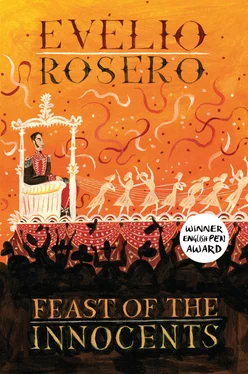There was no-one in the house, or yes, there was someone: very close beside him, in the bed, looking almost like he was breathing, lay the ape, split in half, the hairy suit stretched out lengthways, the feet and hands; the great black head seemed to sniff at him, what time did he take off the disguise? Or had Primavera Pinzón removed it, taking pity on him? Doctor Proceso gave such a heart-rending sigh that he felt sorry for himself, as only an ape could be, he thought, and let out an incongruous laugh, bitterly sorrowful and strangely joyous, a desolate celebration; he remembered Primavera that morning when she discovered the ape peering into her face, how well she faked her mortal fright, what a great Innocents’ prank had been thrown together in an instant — on the back of his practical joke — what dizzying imagination! She had even seized the chance to say “God, but what a beast you are,” and convinced him, a doctor, of the possibility of a death from heart failure; yes, she had mocked him majestically, as only a woman can: his woman. His wife was enough to make you laugh and cry and die and be born again, never another woman like Primavera, he thought, but where had their love ended, if it ever existed? What had become of their love? A foolish word, among the most foolish of all, an infantile deception, just a physical, carnal attraction that lasted as long as the sowing and harvesting of the corn, no longer.
From the kitchen, the cook Genoveva Sinfín, the old woman who had been with him for years, called him with a yell: “Doctor, are you awake? Can you come down?” An unusual cry in the history of the house: something serious must have happened. He put on his dressing gown and opened the window overlooking the garden. “What’s wrong?” he shouted.
“Come down, for God’s sake.”
He ran to the stairs carrying the ape’s head and the rest of the costume; he meant to have them get rid of that nonsense, and forget about it for ever.
Sinfín was waiting for him in the kitchen, hands on hips, face more wrinkled than ever, pinched mouth turned down at the corners, a great grimace of tribulation. Furious — or did she just look it? — Sinfín perspired, eyes brimming with tears, behind the table upon which a sumptuous roast pig reposed, face down on a serving dish; blue flies were circling its broad ears.
The cook brandished a wooden spoon and buried it in one side of the pig; she took it out, steaming, and held it towards him; the doctor saw the stuffing of toasted rice, the pork meat shredded among peas and kidney beans. Then he heard the cook wail:
“Ground glass, señor .”
Yes. Blue streaks of glass glittered along the edges of the spoon.
“It was Floridita. She ruined my week’s work. And to think this pig was for her very own birthday.”
“She couldn’t have,” the doctor said.
He examined the inside of the pig, digging about with the wooden spoon; now he detected big pieces of glass from a broken bottle. The sausage smell made him feel nauseous. Nearby, there was another serving dish, piled high with roast guinea pigs, corncobs and boiled cassava.
“The guinea pigs too,” Sinfín said. “They stuffed them with pins. I don’t know when I let down my guard. I felt them hanging around me, over here, over there; they lay in wait for me, laughing: it was Floridita and her cousin, that little devil Chanchán. God forgive me, but you had to know about it.”
“Order roast chickens for the party,” the doctor said. “Chorizo, chips, pork crackling. And don’t worry about it any more, Genoveva.”
“And what are you going to do about the prank, if you don’t mind me asking, Doctor? It’s not my place to say, but things can’t end here, or aren’t you going to protest?”
“Of course I am, Genoveva. I’ll speak to Primavera: if Floridita and her cousin are to blame they’ll get their proper punishment, don’t you worry. Now, if you’ll excuse me…”
“Doctor, that’s not all. Follow me, please.”
He followed her, displeased, out into the garden. They passed in silence through a large peeling gate. There, sitting on a wooden bench that leant against the trunk of the Capulin cherry tree, where turkeys and hens roamed about, was the gardener, bare chested and with a white shirt tied around his head as a bandage. Even from far away, the doctor could make out the bloody shirt.
“Homero, what’s the matter?” he asked.
“Nothing, señor ,” the gardener answered, blushing. He was a pale, sickly man, around forty years of age, famous for his perpetual silence and because he had long lived in a lonely hut on the edge of the Pasto cemetery. Some said he had killed his wife, burying her under the laundry sink; others that his wife had killed him, even while he lived, because she ran off with the gravedigger, provoking this near muteness in him, that sort of lethargy towards life that was reflected, exactly, in his way of being, just like a corpse, they said: dead to speech, dead to walking about, dead simply to existing at all.
“Nothing?” the cook grew indignant. “Somebody balanced a jug on the top edge of the gate, where Homero comes in every morning. He opened the gate and the jug fell down and cut his head open.”
The doctor walked over to him. “Why didn’t you tell me about this first, Genoveva?”
“Because it had already stopped bleeding,” the cook said.
The doctor untied the shirt carefully. He looked at the wound, touched it.
“Not bad,” he said. “It’s already clotted. No need for stitches, Homero.”
“Of course not, señor . You didn’t have to come,” replied the gardener, bewildered, not losing sight of Sinfín.
A strong smell of human shit, issuing from the gardener’s head, then repulsed the doctor: he took a step backwards.
“The jug was full of it,” Sinfín explained. “Another joke played by Floridita and her Chanchán, celebrating Innocents’ Day in their own fine way, patrón .”
The doctor remembered the ape head he was carrying under his arm, and the rest of the costume: he had noticed his servants’ questioning gaze earlier on.
“Floridita turns seven today,” he said, without looking at anyone. “I won’t say anything today. Tomorrow. Sorry, Homero, I’ll compensate you for that injury, you’ll see. For now, I’m going to ask you a favour.”
And he held out the expensive ape costume he had ordered from Canada.
“Burn this,” he said. “Don’t give it away. I don’t mean hide it, either. Burn it immediately.”
The gardener received the costume without saying a word. He left the garden by the back gate, which led to the garage. He looked strange, weaving his way through pots of geraniums and azaleas with the hairy suit over his shoulder and that enormous gorilla head dangling from his hand: he had half hidden it with the shirt that previously covered his wound, so now the gorilla looked like a hunter’s bloody booty.
Starting to shave, in front of his en-suite bathroom mirror, the doctor was in a position to observe another prank: hanging from the wall behind him, reflected in the mirror, was the scorched body of a black cat spying on him for evermore. It seemed preposterous to him that his younger daughter — just turned seven — should involve herself in such ghastly matters.
He breakfasted, more alone than ever, served by Sinfín, who studied him in silence. And, still overwhelmed by the cat prank, he put on the raincoat hanging from the umbrella stand. He headed for the door, which opened on to the street, feeling sunk in dark presentiments.
“Aren’t we going out in your jeep, Doctor?” Sinfín asked, about to go and open the garage.
“No,” he said. “I’m going to walk.”
“Walk where? They’re expecting you at the finca for the birthday party. It’s getting late, you have to take me, who’s going to cook for them? That’s what we arranged with the señora . Remember Floridita and her Chanchán poisoned the pig: we need to buy some chickens, señor , and the sweet maize dumplings, egg whips, toffee sticks, crumbly alfajores and meringues for the children.”
Читать дальше












